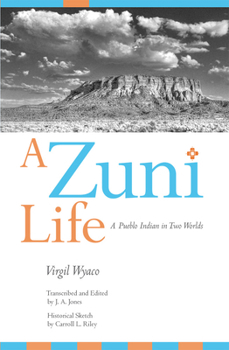A Zuni Life: A Pueblo Indian in Two Worlds
Select Format
Select Condition 
Book Overview
Here Virgil Wyaco, a Zuni Indian elder and leader, recounts his life in both the traditional Zuni and modern Anglo worlds. As a boy, Wyaco learned Zuni ways from his family and the English language and vocational skills in Anglo schools. Earning a Bronze Star during World War II, he killed German soldiers in combat and participated in the executions of SS guards at Dachau. His postwar career included studies at the University of New Mexico, federal employment, marriage to a Cherokee woman, and family life in the suburbs. Later, Wyaco returned to Zuni as postmaster and married a traditional Zuni woman. His election to the Zuni tribal council in 1970 quickly established him as an influential leader. His varied career demonstrates the heartbreaks and rewards of a Native American life bridging two cultures.
Format:Paperback
Language:English
ISBN:0826318819
ISBN13:9780826318817
Release Date:February 1998
Publisher:University of New Mexico Press
Length:153 Pages
Weight:0.46 lbs.
Dimensions:0.5" x 5.3" x 8.1"
Customer Reviews
2 ratings
A Zuni Life
Published by Thriftbooks.com User , 16 years ago
I am a regular visitor to Zuni Pueblo, having fallen in love with Zuni art and jewelry as a child. This book is a great, very readable introduction to life in Zuni. While there is some self promotion evident on the part of the author in the book, it remains a very engaging and interesting story that gives a great introduction to the world view of the Zuni. The first pages grab you and draw you in to the unique Zuni perspective of the world and life.
Life in Zuni -- by an insider
Published by Thriftbooks.com User , 24 years ago
This is a magnificent book, written with skill, sensitivity, insight and the gentle teasing humor that is characteristic of Zuni. After reading it, anyone will easily understand why Tony Hillerman is still an "outsider" to many Native Americans. My dealings with the Zunis began in 1967, when I began writing stories about some aspects of life in Zuni and was honored enough to be the recipient of some of their teasing. It's a good place to start: British humor centers on clever word plays, American humor is blunt slapstick, while the essence of Zuni humor is kindly and gentle teasing. After all, they've lived and prospered in the Southwest for as far back as science can trace. In Zuni terms, they've been here since the beginning of the world. They learned to live in one of the harshest climates of the United States without depending on outsiders. It's only since the coming of the Anglos, which Wyaco portrays as oddball outsiders who vary from insensitivity cruelty to bumbling kindness, that many Zunis have become dependent upon a sometimes crazy American world. His experiences in World War II, which included winning the Bronze Star, are an example. The all-Anglo draft board in Gallup, which easily filled its quotas by drafting Indians, shipped him off to Santa Fe for his medical. He wanted to join the Navy to get out of walking, but was rejected because he'd once suffered three broken ribs when he was kicked by a horse. So, the draft board tried again and sent him off to the Army where he was accepted, even though he'd have to march every day. "It didn't make any sense then. It doesn't now," he writes. The book is filled with such examples of non-Zuni illogic. As a combat rifleman, he killed his share of Germans. He was among the troops who liberated Dachau, and was horrified at how the SS guards had treated the dead. He writes the dead "looked like juniper firewood just unloaded from a pickup truck, no more human than that, all naked and skinny. "The Zunis don't even kill birds without asking permission," he states. "To the Zuni, death is a transition time that must be handled with love and respect by one's closest family. A person's body and hair must be washed, rubbed with corn meal, and pointed to the west toward Kothluwalawa, with prayers to guide the departed spirit on the way." Wyaco was one of a dozen GIs who summarily executed 60 or so Dachau guards, who had surrendered without firing a shot. He says, "I've never felt any remorse for my part in that execution. Those SS guards were more like witches than like men. They'd already lived too long." When he went home, a medicine man brushed him with a wing feather from an eagle and blessed him with corn meal to wipe away such bad spirits from the war. It's the only incident in the book that made him really angry. The rest is an insight into traditional Zuni life. It was written by J. A. Jones, a novelist and anthropologist who became a friend of Wyaco after the war. Jo






